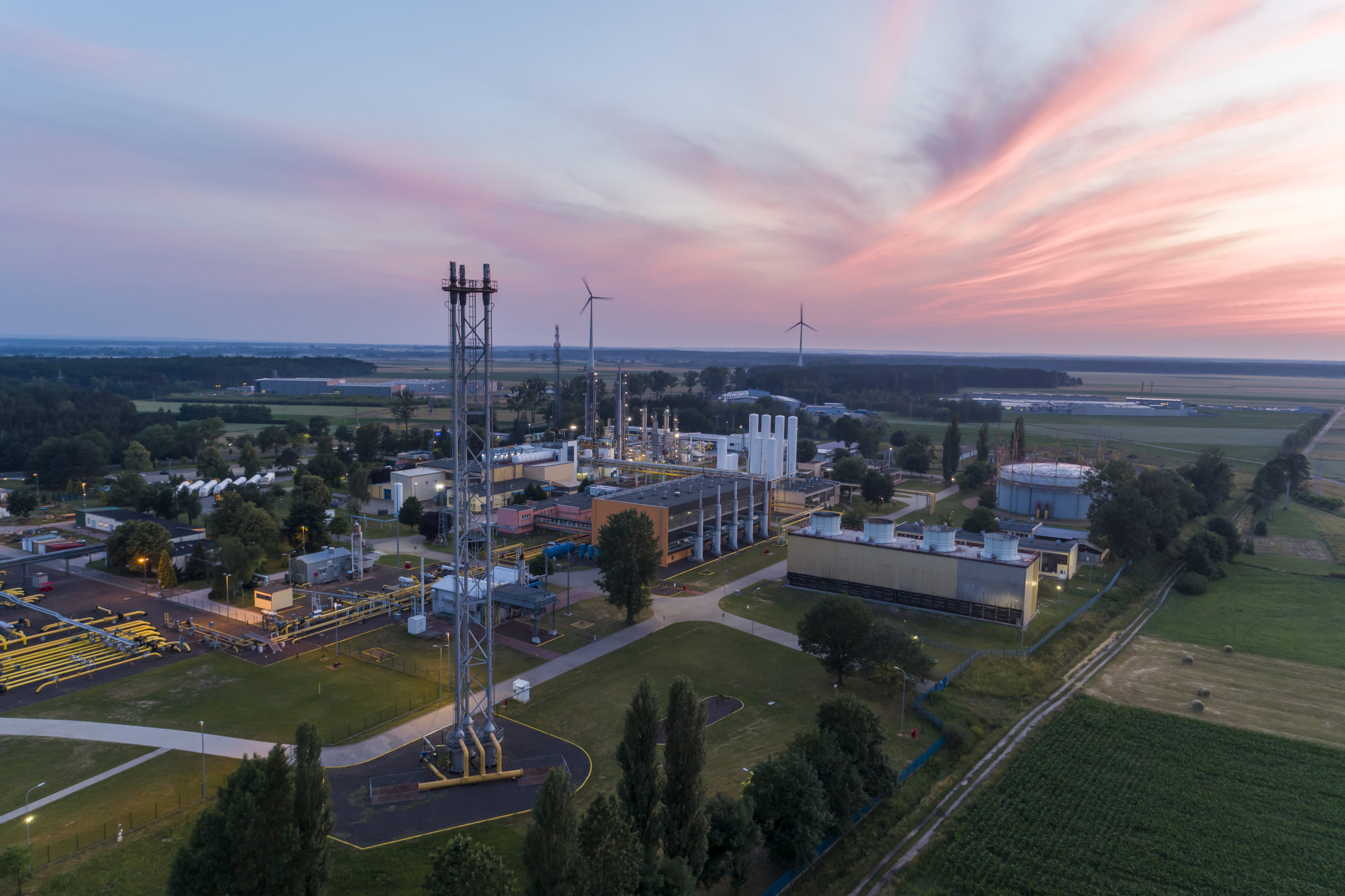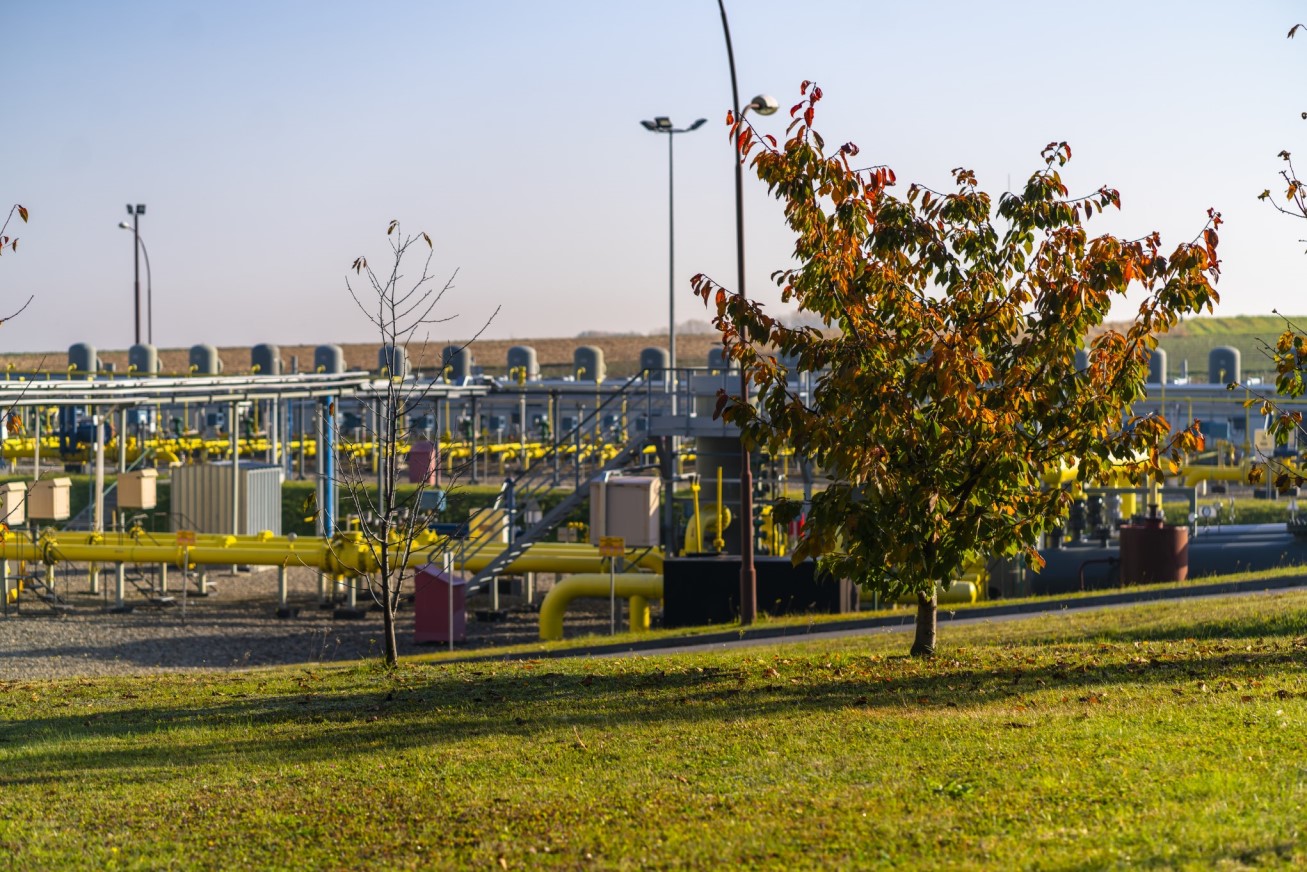
Capital expenditure in 2022
The Group intends to maintain a high level of capital expenditure in 2022. Spending will focus primarily on projects involving maintenance of hydrocarbon production rates, as well as projects in the exploration for and appraisal of crude oil and natural gas deposits, and development of the power generation segment.
Planned capital expenditure* on the PGNiG Group's property, plant and equipment in 2022
| 2022 | ||
| I | Exploration and Production, including: | 3,533 |
| 1 | Poland (PGNiG) | 1,208 |
| 2 | Norway | 2,120 |
| 3 | Pakistan | 134 |
| 4 | Other | 71 |
| II | Trade and Storage** | 858 |
| III | Distribution | 3,152 |
| IV | Generation | 2,995 |
| V | Other segments | 279 |
| VI | Total capital expenditure (I-V) | 10,817 |
** Including the cost of charter of LNG vessels, in accordance with IFRS R16.
Exploration and Production
Working towards its strategic objective of increasing total hydrocarbon production, in 2022 PGNiG will continue to develop and tie in wells in Poland at the Zielona Góra and Sanok Branches. In 2022, PGNiG plans to produce in Poland 3.8 bcm of natural gas (measured as high-methane gas equivalent), the same as in 2021, and 0.677m tonnes of crude oil and condensate.
PGNiG UN will also work towards ensuring stable and predictable long-term gas supplies to Poland. These include both support for the construction of infrastructure to physically bring Norwegian gas to Poland and potential acquisitions of production and/or pre-production assets on the Norwegian Continental Shelf. The company will continue to produce hydrocarbons as a licence partner in the Skarv, Ærfugl, Ærfugl Nord, Morvin, Vilje, Vale, Gina Krog, Skogul, Kvitebjørn, Ormen Lange, Alve, Marulk, Duva, Tambar Øst and Valemon fields, while developing the Tommeliten Alpha field. Development of the Shrek, Alve Nord, Fogelberg and King Lear fields is at the concept phase.
Appraisal and production work is scheduled for 2022 in Pakistan to finish drilling the Rehman-8 well, drill the Rizq-4 well and tie in the Rehman-8 production well. In parallel with the drilling campaign, the PGNiG Pakistan Branch will work on expanding the capacity of the production infrastructure. As part of continued exploration efforts, the Pakistan Branch plans to acquire 2D seismics and start drilling the Rayyan-1 exploration well.
In 2022, another licence area held by PGNiG, i.e. Musakhel, is to undergo a seismic survey to inform a decision whether to drill the first exploration well.
In addition to the work planned for the Kirthar and Musakhel licence areas in 2022, steps are being taken to identify and possibly acquire further attractive assets in Pakistan.
For more information see HERE.
Trade and Storage
As regards wholesale, PGNiG has secured long-term regasification and transmission capacities to cover import requirements of the Polish wholesale market. After the expiry of the Yamal contract at the end of 2022, gas will be imported based on a diversified portfolio of purchase contracts and in cooperation with the PGNiG Group companies active on the European wholesale and LNG markets and strengthening the Group’s position as a gas producer on the Norwegian Continental Shelf.
To achieve strategic objectives and face challenges posed by the fast evolving situation on the gas market, PGNiG Obrót Detaliczny (PGNiG OD) is carrying out a number of operational activities and projects designed to maintain and improve the effectiveness and efficiency of processes critical to customer service.
PGNiG OD will carry on with projects improving the efficiency of sales and customer service, such as development of the CRM and Contact Center, remote customer service tools, product offering, for instance instalment sales of commodity products, continuation of the Stop Smog project, whose scope will include extended cooperation with the National Fund for Environmental Protection and Water Management in 2022 to support households switching to gas heating systems (the company is planning to launch a pilot offering of heating equipment (gas-fired boilers, heat pumps) under its own and partnership sales models), expansion of the CNG and LNG infrastructure (CNG stations, LNG bunkering services, cryogenic tankers) and development of a new business line (solar photovoltaic systems).
Additionally, in 2022 PGNiG OD will be involved in all measures forming part of the anti-inflation shield and dedicated solutions to protect gas fuel customers. This will prompt the company to identify priorities for many other projects and operations or to reconsider the ongoing projects, such as those involving the development of critical ICT systems.
Notwithstanding temporary restrictions caused by the pandemic and the crisis related to energy market prices, PST will continue to develop its business especially in LNG trading, procurement of gas from the North Sea and Norwegian Sea area and gas trading in Central and Eastern European markets.
As for storage, with the commissioning of five chambers in Cluster B at the end of 2021, 10 storage chambers with a working capacity of 299.7 mcm are active at the Kosakowo CUGSF. GSP plans to expand its storage business, in particular storage of energy (in the form of hydrogen), hydrogen, biomethane, compressed air and liquid fuels, in order to broaden its customer base and secure new revenue streams. The offered services will include preparation, execution and supervision of underground energy and fuels storage projects and subsequent offering of the storage capacities. In 2022, GSP will continue working on hydrogen, biomethane, compressed air and LPG storage projects. Moreover, as part of non-regulated activities, a new service will be continued in 2022 relating to the operation of a gas drying system in Mikanowo.
For more information see HERE.
Distribution
In the short term, PSG is taking steps which, through the roll-out of the gas network and connection of end customers (mainly as part of „network densification”, i.e. connection of new service lines to the existing gas network), are part of the anti-smog measures. In parallel, PSG participates in the ‘Connect, because every breath matters’ campaign.
In the medium term, PSG takes steps to convert, modernise and build a new gas network in order to maintain the security and continuity of gas fuel supplies and the long-term capacity to connect new industrial customers, including in particular district heating accounts below 50 MW.
The company recognises business potential in the development of the market for new renewable gas products and the target volumes of these gases to be transported, which can offset (to an extent dependent on economic and regulatory factors) the declining significance of natural gas in the energy mix of the ‘Green Deal’ economy. Therefore, PSG is conducting multi-faceted analyses to prepare the gas infrastructure for the distribution of renewable gases.
PSG also engages in cooperation with other entities to develop a business model which, taking into account the prevailing market conditions and the policy of the state, will enable the development of alternative fuel infrastructure and create conditions to offer vehicle users a viable CNG refuelling option.
The company will complete all projects to build CNG filling stations (planned projects, i.e. 23 CNG filling stations, including two LCNG facilities).
For more information see HERE.

Generation
PGNiG TERMIKA S.A. will proceed with its strategic projects and will actively seek acquisition opportunities in the power and heating sector. The company intends to markedly scale up the volume of electricity sales by implementing projects aimed at building new, cost-effective generation capacities and upgrading existing sources using low-carbon technologies.
In 2022, the company will continue work on several projects, including the construction of a peak-load boiler house at the Żerań CHP plant (phase 2), preparations for the construction of a 75 MWe multi-fuel unit and preparations for the construction of a CCGT unit at the Siekierki CHP plant.
Capital expenditure planned for 2022 in the area of environmental initiatives will cover adaptation of the Kawęczyn heat plant to the BAT conclusions, upgrade of the Pruszków CHP plant, upgrade of absorbers 1 and 2 at the Siekierki CHP plant, a programme to reduce noise generated by the plants and upgrade of the sanitary sewage system.
PGNiG TERMIKA S.A. will pursue an investment programme, including upgrades to its existing generation assets, aimed at building new high-efficiency and cost-effective generation capacity using low- and zero-emission technologies adapted to increasingly stringent environmental requirements. Steps will be taken to expand the company’s business and R&D&I projects focusing on the use of hydrogen in the energy sector, the construction of heat and electricity batteries, the increased use of renewable energy sources in power generation as well as the use of Power-to-Heat technologies.
For more information see HERE.
Other growth projects
In 2022, efforts will be made to step up development of the PGNiG Group’s hydrogen technologies, to continue working on digitalisation of the business and to apply new solutions to PGNiG’s core business, especially in the Exploration and Production and Storage areas. Priority will be given to the completion of ongoing R&D&I projects and to the commercialisation of further products. At the same time, new business areas that can increase the competitiveness of companies and strengthen their market position will be constantly analysed. New projects will also be gradually identified and pursued in key development areas: Renewable Energy Sources (including development of photovoltaic offering and construction of own RES portfolio), alternative fuels and energy efficiency.
For more information see HERE.

